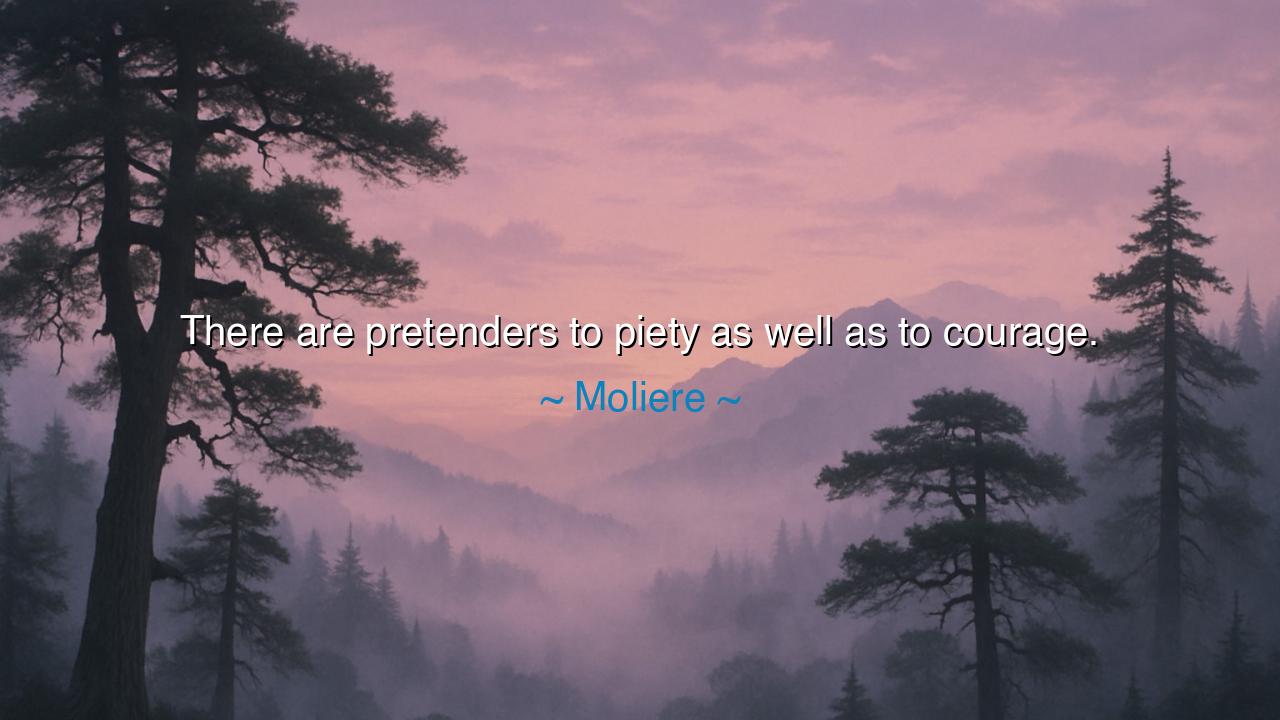
There are pretenders to piety as well as to courage.






“There are pretenders to piety as well as to courage.” Thus spoke Molière, the great French dramatist, who wielded his pen as both mirror and sword — a mirror to reflect human folly, and a sword to pierce the hypocrisy that so often hides beneath the garments of virtue. In this simple yet piercing declaration, he exposes a truth that has haunted every age: that many who appear holy are hollow, and many who seem brave are but actors upon the stage of life. Both piety and courage are noble virtues — but they are often counterfeited, for they win the admiration of men. Molière, ever the observer of souls, warns us that not all who wear the mantle of goodness or valor deserve it.
The origin of this saying lies in Molière’s lifelong war against hypocrisy — particularly that of the self-righteous and the false devout. Living in 17th-century France, he witnessed a society where religious piety was often performed as theater, where the language of faith became a mask for greed, vanity, and power. In his immortal play Tartuffe, he unmasked the hypocrisy of those who use religion as a cloak to deceive and dominate. The character Tartuffe, pretending to holiness, enters a household under the guise of sanctity, only to seduce, manipulate, and nearly ruin those who trust him. From such human frailty and deception arose Molière’s timeless wisdom: there are indeed pretenders to piety, just as there are false warriors who boast of bravery yet flee at the first sound of battle.
To pretend to piety is a greater sin than open vice, for it corrupts the very face of virtue. The wicked man declares himself an enemy of goodness and can be guarded against, but the false saint poisons goodness from within. He speaks of righteousness yet acts in deceit; he bows his head in prayer while his heart burns with pride. Such hypocrisy is dangerous, for it turns faith into a tool of control and dishonors what is sacred. True piety is humble — it serves silently, gives freely, forgives readily. It seeks not praise, for it lives in sincerity of spirit. The pretender to piety, however, is not moved by love of God or goodness, but by the hunger for reputation and influence.
So too, pretenders to courage abound in every generation. They speak loudly of valor, of duty, of strength — yet their hearts tremble when truth demands sacrifice. They wear the armor of heroes but flee when honor calls for endurance. History is filled with such men — those who boast of bravery in the safety of words, but vanish when deeds must follow. Yet contrast them with the quiet soul who makes no boast, who trembles yet stands firm in the hour of trial. For true courage is not the absence of fear, but the mastery of it; it is not found in boasting, but in enduring. The pretender to courage seeks glory, but the courageous man seeks only what is right.
Consider the story of Joan of Arc, the humble maiden who stood before kings and armies with no armor save faith. She did not pretend to piety — she lived it; she did not claim courage — she embodied it. When she was accused and condemned by the very men who pretended to holiness, her words cut through their hypocrisy like flame through shadow. She faced death with serenity, not for glory, but for truth. Molière’s words find their perfect counterpoint in her life: she was no pretender, but the real union of faith and valor, proving that what is genuine needs no disguise, and what is false cannot endure the fire of trial.
Molière’s wisdom therefore calls us to discernment. The world is filled with noise — with those who proclaim their virtue but practice deceit, with those who exalt their courage but shrink from justice. We must learn to see not with the eyes, but with the soul — to weigh deeds, not words; sincerity, not appearance. The false pious and the false brave will always find followers, for mankind loves spectacles more than substance. But the wise man, the one who seeks truth, will recognize that the most authentic virtue is quiet, steadfast, and selfless.
And so, dear listener, take this teaching to heart: be neither a pretender to piety nor to courage. Let your faith be lived, not performed; let your strength be proven, not proclaimed. When you speak of goodness, let it be through action. When you face fear, meet it not with pride but with resolve. Seek not the approval of men, but the peace of a clear conscience. For in the end, the pretenders fade like actors when the play is done — but the truly pious and the truly brave live forever in the memory of the world.
As Molière reminds us, the world may admire appearances, but Heaven honors truth. Therefore, live not as an actor in the theater of virtue, but as a soul sincere before God and man. For only those whose hearts are pure — whose piety is humble and whose courage is real — will stand unmasked when the final curtain falls.






AAdministratorAdministrator
Welcome, honored guests. Please leave a comment, we will respond soon